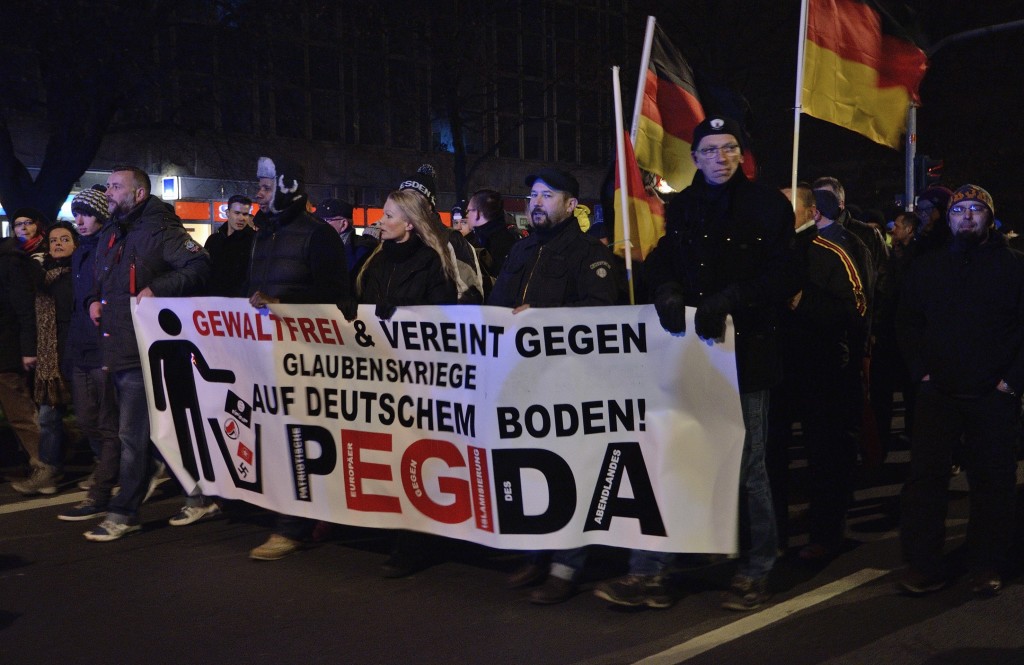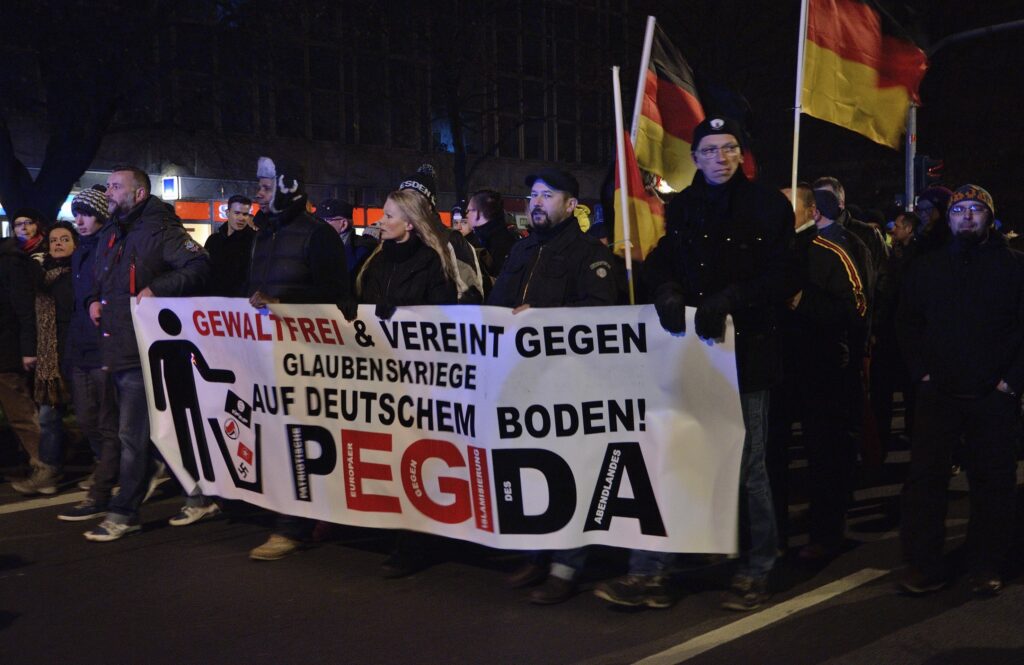
We look back upon World War II with a furrowed brow and incredulous gaze, wondering how millions of people could be led to espouse such hateful ideas, based exclusively on unsubstantiated leaps in logic, pseudo-scientific assertions, and politically-engineered ‘truisms’. How could so many educated people subscribe to such ridiculous ideas? And yet, over 75 years later, here we are in Germany, one of the world’s most tolerant societies, watching the same campaign of agnotology enfold the Pegida movement.
Comparisons between Pegida and the Nazi Party have already been made, and perhaps even belabored since its parallels are, unfortunately, rather apparent. However, most interesting may be not the two groups’ similarities, but rather their differences. The Nazis galvanized the masses by scapegoating Jews for poor economic conditions. Pegida is responding to a German national identity crisis and a systemic fear of radical Islam. Nazis originally intended to marginalize the Jewish communities of Europe. (Hitler’s inner circle devised the policy of mass extermination at the Wannsee Conference in January 1942.) Pegida, however, seeks to prevent extremism and conserve a liberal and secular German state. However, its policy of refusing immigrants and refugees entry into Germany doesn’t align with those goals.
Pegida, or Patriotische Europäer gegen die Islamisierung des Abendlandes, began as many political movements now do: on the Internet, which remains its primary vehicle of propagandizing. The group has rallied as many as 25,000 people in Dresden and boasts nearly 160,000 Facebook followers. According to its official page, Pegida seeks to ensure that all children may grow up in a cosmopolitan Germany, free from the violence of radical Islamic groups such as the Kurdistan Worker’s Party (PKK), Islamic State (IS), al-Qaeda, etc. Supporters also advocate for a separation of church and state, citing the philosophy of Mustafa Kemal Ataturk, known for establishing a modern, secular Turkish state in 1923. On the surface, Pegida’s mission welcomes secular Muslims. However, many Germans including Chancellor Angela Merkel recognize its true intentions. In the chancellor’s 2015 New Year’s address, she warned her constituents of Pegida’s true rhetoric, saying:
“Today many people are again shouting: ‘We are the people’. But what they really mean is: you are not one of us, because of your skin color or your religion…I say to all those who go to such demonstrations: do not follow those who have called the rallies because all too often they have prejudice, coldness, even hatred in their hearts.”
The organization has denied all allegations of racism and xenophobia and remained adamant that it only seeks to combat extremism and challenge Germany’s immigration and asylum policies. Yet, the inconsistencies between its actions and intended goals either indicate abhorrent prejudice or naïveté.
If Pegida primarily sought to eradicate extremism, it wouldn’t target refugees or asylum seekers. Millions of people have been displaced by terrorist organizations like IS, which has invaded, slaughtered, raped and destroyed much of Iraq and Syria. Refugees come from these war-torn regions and look to Germany, Europe’s strongest economy, for safety and economic opportunity. They view these terrorist organizations as enemies, not as sources of inspiration. Therefore, to assume that the influx of refugees is inviting domestic extremism is simply ignorant.
Pegida’s skewed view of asylum seekers reveals another inconsistency in its philosophy. Germany has welcomed more asylum seekers than the rest of Europe, Australia and Canada combined. Its thriving economy, generally tolerant culture and willingness to accommodate those in need has made it the most attractive place for those seeking security and stability. Many countries antagonize and marginalize peaceful, non-radical Muslims, causing frustration and anger to fester until certain at-risk individuals erupt in some act of violence.
However, Germany is in a unique position within the international system: its tolerance puts it in a less likely position to experience a domestic attack. Pegida and other such anti-immigrant movements threaten that harmony. Its policies should aim to welcome and integrate the incoming Muslim population, not engender tensions and divisions—the exact conditions that lead to frustrated individuals manifesting their anger in senseless violence.
While Pegida’s rhetoric against violent extremism might be effective during a period heightened terrorist activity, it’s an unconvincing mission statement for a group whose founder, Lutz Bachmann, recently posted a selfie of himself styled with the notorious Hitler hair part and mustache. Moreover, two weeks prior to Pegida’s first march, Bachmann sent private messages referring to asylum seekers as trash and scumbags. Though these revelations have led to his resignation, they’re indicative of the group’s social agenda: to use the pervasive fear of radical Islamic terrorism to drive out Germany’s non-white, non-Christian population.
As millions witnessed during the Charlie Hebdo solidarity movement, many Muslims have demonstrated a profound allegiance to their nation’s ideals. Millions, whether online or on the streets of Paris, defended the magazine’s right to freedom of speech before they criticized its offensive depictions of Islam. Supporters of Pegida should take greater note of these trends rather than pigeonholing Muslims into a category of people who want to ‘Islamize’ Germany. If the organization seeks to preserve German culture, it should shift its strategy to increasing patriotism among immigrants and refugees. They might even discover that there’s less of a desire to ‘Islamize’ Germany than to embrace its freedoms and customs.
The views expressed by the author do not necessarily reflect those of the Glimpse from the Globe staff, editors, or governors.









